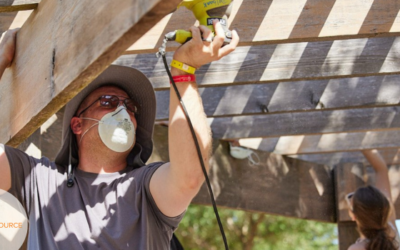Download a PDF of the Bible Study: Mission Impossible to use with your group.
Starter Questions:
- What is your mission? What are you about? What do you want to accomplish with your life?
- What will help make that mission possible for you accomplish?
Transition: “What’s your mission?” It may seem like a deep question and one that will require much time and study, but for Christians, the broad answer is quite simple. Our mission today is the same mission Jesus gave to His disciples before He ascended into heaven, in Matthew 28:19-20, “Therefore go and make disciples of all nations, baptizing them in the name of the Father and of the Son and of the Holy Spirit, and teaching them to obey everything I have commanded you. And surely I am with you always to the very end of the age.” As Christians, spreading the Gospel message through word and action should be our purpose and our daily focus; we are called to live a missional life, not in order to be saved, but because we know we are saved. Living out our faith is a response to what Jesus did for us through His death and resurrection.
What does a missional life look like? After Jesus ascended into heaven, the disciples had to figure that out, too. They knew their mission, now they had to live it. Let’s take a look at some examples in the book of Acts of how the disciples carried out that mission in their everyday lives…
Read Acts 3:1-10 and discuss.
- What were Peter and John planning to do on this day? (They were going to the temple.)
- How did God intervene in their day? (He placed a crippled beggar in their path.)
- How did they react to the man? (Peter healed him.)
- Read Acts 3:11-20- What opportunity did the healing provide for Peter? (People flocked to him and he was able to share the Gospel with them.)
Read Acts 16:16-34 and discuss.
- What were Paul and Silas planning to do this day? (They were on their way to the place of prayer.)
- How does God intervene in their day? (They crossed paths with a slave girl who was possessed and healed her, which led them to be sent to prison.)
- What do they do while they are in prison and what is the result? (They continue to witness, they sing and pray and then tell their jailer and his family about Christ.)
Transition: Take a minute to flip through the following chapters in Acts and you will see that Paul went to Thessalonica, Berea, Athens, Corinth, Ephesus, Macedonia and Greece. He never knew where God would lead him next, but wherever he was and in all circumstances, he was preaching the Gospel to anyone who would listen. Later, as a prisoner, Paul finds himself on a boat in the middle of a storm…
Read Acts 27:13-26.
- How did God use Paul in this situation? (God spared all the people on the ship- no one was killed in the storm.)
All of the men are able to reach the shore of the island of Malta…
Read Acts 28:1-10.
- How did God use Paul in this situation? (Paul showed God’s love and healed the people of the island who then provided them with the supplies they needed to continue on their journey.)
Discuss:
- What was Paul and the other apostles’ mission in life? Read Acts 20:22-24 and Acts 28:30-31. (To testify to the Gospel of God’s grace wherever the Spirit led them no matter what would happen to them.)
- What was their motivation? Read Acts 4:12 and 20. (They had witnessed Jesus’ death and resurrection and knew it was not something they should keep to themselves, but that Jesus’ message was for everyone.)
- How did they handle negative responses to their message? (It did not deter them, they kept boldly preaching. They cared more about what God wanted than anything else, even their own lives.)
- What made their mission possible? (It was only through God. Time after time, God assured them that He was with them and would take care of them. The Holy Spirit worked through the apostles to heal people, which opened the door for them to preach the Gospel. When Paul was on trial, he shared the Gospel; when he was in prison, he shared the Gospel; whomever he encountered along his way would hear the Gospel.)
What About You?
- On a scale of 1 to 5, how aware are you to how God might be intervening in your day? (1 = I’ve never thought about it; 5 = I’m always looking for doors God may be opening for me to share the Gospel)
- On a scale of 1 to 5, how open are you to God interrupting your plans? (1 = I have a plan and I’m sticking to it; 5 = I’m open to wherever God takes me today)
- As Christians, what is our mission? (To proclaim the Good News in word and action.)
- What is our motivation? (It is our response to God’s love and Jesus’ death and resurrection.)
- What would missional living look like in your everyday life? (Being aware of doors God may be opening for us to provide us the opportunity to share His love, always having our mission in mind, trusting God that no matter what situation we face, God can use it for His purpose…)
- How can you stay focused on your mission of sharing the Gospel? (In Acts, the apostles and other Christians regularly met together, prayed together and supported each other. As Christians today, it is important that we are part of our local church, that we worship together, regularly take Holy Communion, pray for and with each other and support each other).
- Why is our mission possible? (Because through Baptism, we have the power of the Holy Spirit in us.)
Wrap Up: Read 2 Timothy 1:7-10 and Romans 1:16-17. Like the apostles, it is only because of God that our mission to share the Gospel is possible. God promises that He will give us His Spirit, a Spirit of power, not timidity, so that we too can boldly proclaim the Gospel wherever God places us, to whomever we encounter and in any situation we face.
Close in prayer.






0 Comments